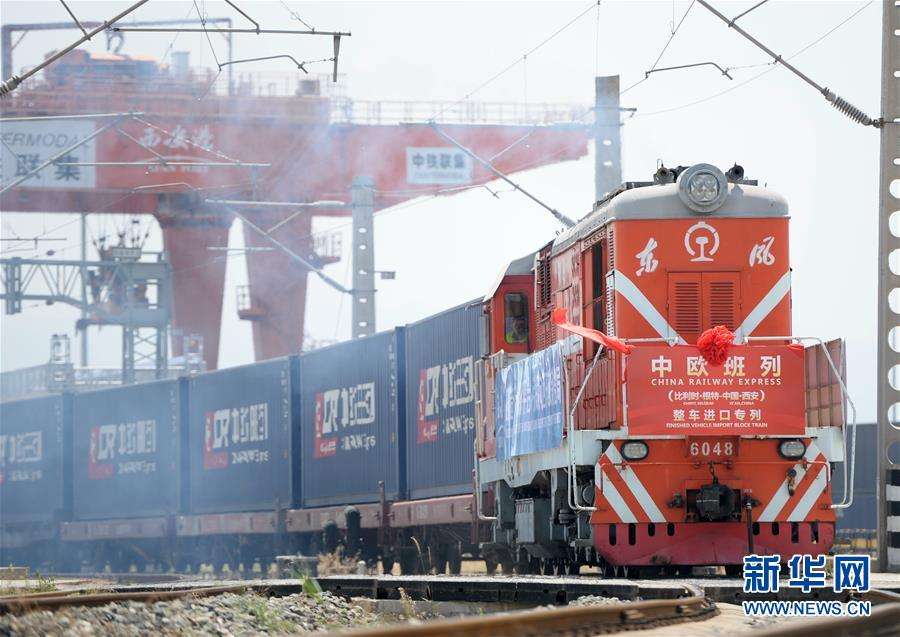


(Photo/Xinhua)
A Russian woman who lives in Wuhan, central China's Hubei Province, has said she hopes that there will be more trains linking China and Europe in the future, so that one day she will be able to travel around the world by the China-Europe passenger train, Chinanews.com reported on Feb. 1.
With the Spring Festival approaching, almost all Chinese people are heading home for family reunions across the country. Instead of returning to her hometown in Russia, Liu Yina (Chinese name) has decided to stay in Wuhan and enjoy the traditional Chinese festival.
Liu, who is fluent in Chinese, works for Wuhan Asia-Europe Logistics Co., Ltd., the operator of China-Europe freight trains between Wuhan and Europe and a public platform for international logistics and transportation services.
Liu comes from Russia’s Far East region. She fell in love with her husband Liu Xiaolong, a Chinese man from Tianmen City, in Hubei Province, when she was a student at St. Petersburg State University in Russia. They got married in Wuhan in 2014, and settled in the city.
As she is in charge of trade in her company, Liu often travels to Russia on business, negotiating with Russian companies. So far, she has helped introduce wine, dairy products, grain and oils from many Eurasian countries to Chinese consumers.
Liu is proud that she can contribute to the economic and trade ties between China and Russia. Working and living in China for many years, Liu has gradually adapted to the local life in Wuhan. She said that she found interesting Chinese customs in the city, such as the local tradition of giving milk as a gift during the Spring Festival.
Her professionality enabled her to discover new business opportunities. Liu said that “before this year's Spring Festival, milk from Russia was brought to Chinese stores by the China-Europe freight trains, diversifying the gift options for Spring Festival.”
Liu isn't the only member of her family in Wuhan, either. She advised her younger sister to seek opportunities for professional development in Wuhan, and her sister is now learning Chinese in the city.
The China-Europe freight trains, with a cross-border logistics network covering 76 cities in 34 Eurasian countries, have significantly boosted the connectivity of land transportation between China and Eurasian countries.
Besides products such as timber, automotive components, machinery, electronics, clothing, textiles and medical equipment, various new products from countries and regions involved in the Belt and Road Initiative have been brought to China by the China-Europe freight trains, including soda water from Austria, beer and wine from Germany, edible oils from Russia and Kazakhstan, as well as juice and milk from Belarus.
At the same time, Chinese products including crayfish, mangoes, grapefruit, tangerines, seasonings, and tea are also delivered to many Eurasian countries.
 Fire brigade in Shanghai holds group wedding
Fire brigade in Shanghai holds group wedding Tourists enjoy ice sculptures in Datan Town, north China
Tourists enjoy ice sculptures in Datan Town, north China Sunset scenery of Dayan Pagoda in Xi'an
Sunset scenery of Dayan Pagoda in Xi'an Tourists have fun at scenic spot in Nanlong Town, NW China
Tourists have fun at scenic spot in Nanlong Town, NW China Harbin attracts tourists by making best use of ice in winter
Harbin attracts tourists by making best use of ice in winter In pics: FIS Alpine Ski Women's World Cup Slalom
In pics: FIS Alpine Ski Women's World Cup Slalom Black-necked cranes rest at reservoir in Lhunzhub County, Lhasa
Black-necked cranes rest at reservoir in Lhunzhub County, Lhasa China's FAST telescope will be available to foreign scientists in April
China's FAST telescope will be available to foreign scientists in April "She power" plays indispensable role in poverty alleviation
"She power" plays indispensable role in poverty alleviation Top 10 world news events of People's Daily in 2020
Top 10 world news events of People's Daily in 2020 Top 10 China news events of People's Daily in 2020
Top 10 China news events of People's Daily in 2020 Top 10 media buzzwords of 2020
Top 10 media buzzwords of 2020 Year-ender:10 major tourism stories of 2020
Year-ender:10 major tourism stories of 2020 No interference in Venezuelan issues
No interference in Venezuelan issues
 Biz prepares for trade spat
Biz prepares for trade spat
 Broadcasting Continent
Broadcasting Continent Australia wins Chinese CEOs as US loses
Australia wins Chinese CEOs as US loses